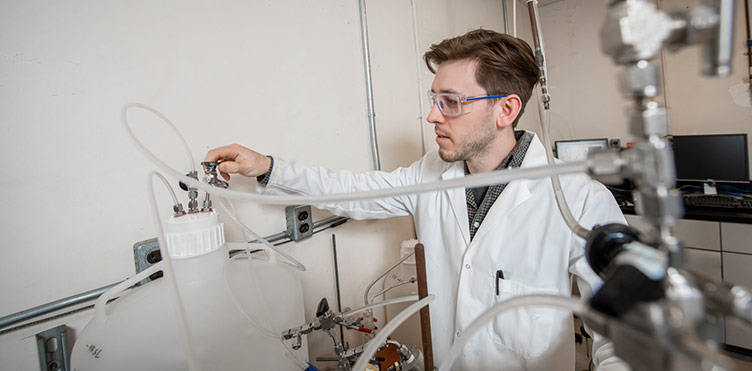Chemical Engineering

- Degree Offered: MScE, MEng & PhD
- Application Deadline: Open
- Study Options: Coursework, Thesis
- Length: 1 Year (MEng) | 2 Years (MScE) | 4 Years (PhD) Years
- Entry Terms: Fall, Winter
UNB's faculty of engineering's chemical engineering department offers students the opportunity to work with innovative faculty members who have diverse expertise and research interests. With society's increasing focus on research and innovation now is a great time to consider adding to your undergraduate education.
Our students have access to labs and research centres within the Chemical Engineering department for example: in the Materials Surface Characterization Laboratory, Limerick Pulp and Paper, Nanotechnology, UNB Hydroprocessing Laboratory, Oil Recovery Laboratory, Polymer Laboratory.
Research areas
- Catalysis
- Nuclear
- Pulp and paper
- Adsorption and gas separation
- Polymers
- Nanotechnology
- Aqueous Chemistry
- Corrosion
- Green Packaging Materials
- Cellulose Nano Materials
- Biorefinery/Biofuels
- Material and Radioactivity Transport
Current faculty research
- Nuclear: Focusing on the study of the behaviour of materials in supercritical water Dr. William Cook’s research lab is conducting some of the essential research anddevelopment required to make the supercritical water reactor a technical viable product. Dr. Palazhchenko's group applies experimental and computational techniques to understand corrosion product behaviour in nuclear plant systems. Bench-scale experiments, flow-through loops, and thermal-hydraulic and activity transport modelling are used to simulate plant chemistry conditions and events.
- Water and Soil Remediation: Dr Laura Romero-Zeron's current research projects include remediation of hydrocarbon contaminated soils, selective adsorption of pharmaceutical drugs and toxins using natural fibers, upcycling of plastic waste, recovery and identification of biosurfactants, polymer-surfactant self-assembing systems, evaluation of synthetic and biopolymers functionality, rheological evaluation of polymer-surfactant systems and biooils, and pyrolysis of biomass waste to produce value-added additives.
- Pulp and Paper: Dr. Yonghao Ni is working towards improvements in the pulping and bleaching process, and focusing research on high-yield pulp properties. Dr. Zhibin He and team are researching and developing novel and green technologies and sustainable products in the fields of pulp and paper, molded pulp products, barrier packaging materials, biorefinery, cellulose nano materials, bio-composite materials based on wood fibers, cellulose, hemicellulose and lignin.
- Adsorption: Dr. Mladen Eić's recent research work has been used to determine diffusivities in gas mixtures as well as composite materials, such as bimodal materials.
- Polymers: The polymer research team and Dr. Huining Xiao have been conducting research on various projects related to the polymers as functional polymers. They work on antimicrobial polymers, strength additives and nanoparticles for value-added paper products.
- Nanotechnology: Dr. Felipe Chibante has significant experience in the research and commercialization of nanomaterials. The work conducted centres around several key areas including carbon and natural nanomaterials production, nanocomposites engineering, nanoelectronics and nanofluidics.
- Clean Fuels and Catalysis: Dr. Kyle Rogers's research team develops catalysts and chemical processes for producing clean fuels such as hydrogen and bio-oil. Research projects focus on the thermochemical processing of biomass (e.g., pyrolysis, liquefaction), the catalytic upgrading of bio-oil, hydrogen production and conservation, and waste-to-energy technologies.
Application requirements
- Applicants interested in research (thesis) can indicate their research interests on the application.
- Applicants from Canada or United States should hold an undergraduate degree with a minimum GPA 3.0 (B or 70%). International applicants must have a GPA Canadian equivalent to 90% or higher. Applicants to the PhD program normally hold a Masters degree from an accredited university.
- Applicants are required to submit a complete application, including three references and a one-page statement describing their research interests.
- International Applicants whose first language is not English will be required to submit language scores. Minimum TOEFL score of 580, and a TWE score of 5.0 (computer based scores would be 237 and 5.0 or greater and Internet score of 94, writing and speaking minimum 22). IELTS (minimum score of band 7); MELAB (minimum score of 85); or CanTest (minimum score of band 4.5); Duolingo (minimum score 120); PTE (minimum score 65). International applicants should have a Canadian GPA equivalent of 90% or higher.
Contact us
For more information, contact Dr. Brian Lowry, Director of Graduate Studies, or Sylvia Demerson, Program Secretary.
Office: Head Hall, Rm. D39
Phone: 1-506-453-4520
Related: Faculty of Engineering
